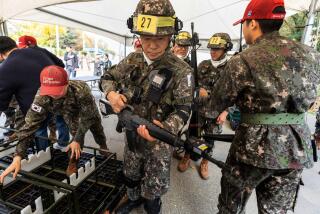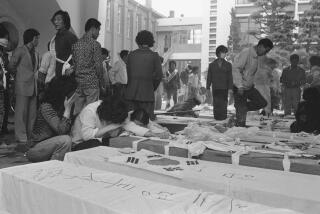Finding Justice for No Gun Ri
- Share via
Pentagon lawyers preparing an investigation of the Army’s role in the killing of South Korean civilians nearly 50 years ago are reportedly pondering a blanket grant of immunity to surviving veterans who might have taken part in the shootings.
The argument against immunity is that some who might be guilty of what today would indisputably be seen and prosecuted as war crimes would escape punishment.
The argument for immunity is the problem of relying on half-century-old memories to build a prosecutable case, and whether federal law as it existed in 1950 would even permit prosecution.
It’s a delicate issue involving, among other things, whether U.S. authorities are prepared to go after their own citizens implicated in wartime atrocities with the same vigor that they go after others. Yet it is also an issue with only one practical resolution. Given the difficulties, maybe even the impossibility, of successful prosecution, the Pentagon’s priority should be the fullest possible disclosure of the facts involved in the massacre at No Gun Ri in the chaotic early days of the Korean War: Who gave the orders to shoot? In what circumstances? And how many civilians were killed?
A heavy burden rests on the Pentagon to bring out the full truth in this tragedy. For years it dismissed the stories of Koreans who survived the killings.
As recently as this year it said it could find no basis for their claims.
However, Associated Press reporters were able to uncover evidence that the military, with all its resources, insisted that it couldn’t discover, including documents from the Army’s own files and interviews with veterans from the Army’s 1st Cavalry Division who were present when the killings occurred.
The Pentagon’s past denials properly will be seen by many as casting a long shadow over its credibility in the pending investigation.
Justice is not only a matter of punishment. Justice can also be served by having the moral courage to accept responsibility and make recompense when a grave wrong has been done, however long ago and far away the event.
More to Read
Sign up for Essential California
The most important California stories and recommendations in your inbox every morning.
You may occasionally receive promotional content from the Los Angeles Times.










